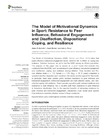| dc.contributor.creator | Perry, John | |
| dc.contributor.creator | Nicholls, Adam R. | |
| dc.contributor.creator | Morley, David | |
| dc.date.accessioned | 2018-09-28T14:01:15Z | |
| dc.date.available | 2018-09-28T14:01:15Z | |
| dc.date.issued | 2016 | |
| dc.identifier.citation | Nicholls AR ,Morley D and Perry JL (2016) The Model of Motivational Dynamics in Sport: Resistance to Peer Influence, Behavioral Engagement and Disaffection, Dispositional Coping, and Resilience. Front. Psychol. 6:2010. doi:10.3389/fpsyg.2015.02010 | en_US |
| dc.identifier.uri | http://hdl.handle.net/10395/2214 | |
| dc.description | The model of motivational dynamics in sport: resistance to peer influence, behavioral engagement and disaffection, dispositional coping, and resilience | en_US |
| dc.description.abstract | The Model of Motivational Dynamics (MMD; Skinner and Pitzer, 2012) infers that peers influence behavioral engagement levels, which in turn is linked to coping and resilience. Scholars, however, are yet to test the MMD among an athletic population.The purpose of this paper was to assess an apriori model that included key constructs from the MMD, such as resistance to peer influence, behavioral engagement and disaffection, coping, and resilience among athletes. Three hundred and fifty-one athletes (male n=173, female n=178; Mag e=16.15 years) completed a questionnaire that measured each construct. Our results provide support for the model. In particular, there were positive paths between resistance to peer influence and behavioral engagement, behavioral engagement and task-oriented coping, and task-oriented coping with resilience. There was also a positive path between resilience and resistance to peer influence, but a negative path from resistance to peer influence to behavioral disaffection. Due to the reported benefits of enhancing resistance to peer influence and behavioral engagement, researchers could devise sport specific interventions to maximize athletes’ scores in these constructs. | en_US |
| dc.language.iso | eng | en_US |
| dc.publisher | Frontiers | en_US |
| dc.relation.ispartofseries | 6;2010 | |
| dc.rights.uri | https://fpsyg-06-02010%20(1).pdf | en_US |
| dc.subject | Behavior | en_US |
| dc.subject | Peers | en_US |
| dc.subject | Mental toughness | en_US |
| dc.subject | Motivation | en_US |
| dc.subject | Motivational climate | en_US |
| dc.subject | Sport | en_US |
| dc.title | The model of motivational dynamics in sport: resistance to peer influence, behavioral engagement and disaffection, dispositional coping, and resilience | en_US |
| dc.type | Article | en_US |
| dc.type.supercollection | all_mic_research | en_US |
| dc.type.supercollection | mic_published_reviewed | en_US |
| dc.description.version | Yes | en_US |
| dc.identifier.doi | 10.3389/fpsyg.2015.02010 | |


